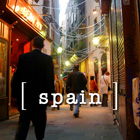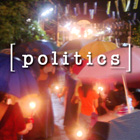
|
CATALÁNS FAVORED THE NEW AUTONOMY CHARTER 74% TO 21%, OPENING NEW ERA FOR SPANISH CONSTITUTIONAL SYSTEM 20 June 2006 Catalunya —commonly written 'Catalonia' in English—, a region of northeastern Spain, along the Mediterranean and the French border, has approved a new regional charter by popular referendum. The 'Estatut' gives the culturally distinct and historically complicated region greater autonomy over taxes revenues, policy and infrastructure. The new Estatut also establishes Catalán, one of Spain's four co-official languages, as the "preferred language" for administrative and economic affairs. The language had been suppressed for decades under the fascist government of Francisco Franco, and has been part of a regional bilingual standard since 1978 when the current democratic constitution was enacted. Conservatives in the opposition Popular Party have warned the new autonomy granted the region might lead to the "Balkanization" of Spain and the breakdown of the democratic republic established after Franco's death. But there is some question as to whether Catalunya's gains are actually very radical.
The region was taken over by the Castilian monarchy in the war of Spanish succession, deprived of its prized ancient 'usatges' —independent laws— on 11 September 1714. Since that time, the quest to re-establish both the independent linguistic background and political system of the region has been a hallmark of regional culture. Spain's constitutional monarchy is divided into 17 'autonomous communities' or autonomías, each of which is arranged politically and fiscally in accordance with its own regional charter, or estatuto (in Castilian Spanish). Catalunya, one of the wealthiest autonomías, has had to relinquish its revenues to Madrid, receiving a reduced percentage for state-funded projects and infrastructure. It is the fiscal element which has produced the most fodder for political opponents. The conservative Popular Party enjoys strong support in underdeveloped, poorer rural areas, and has sought to paint the Catalán Estatut as an attempt to take from those areas what they cannot produce on their own. In fact, it simply permits Catalunya to specify that its revenues be directed to assist other autonomous communities with basic necessities and development, not with town fairs and subsidies. The linguistic element has raised concerns among non-bilingual Spaniards, that Catalán officials could impose new language policies that would limit their ability to compete in a more independent Catalunya. But, while the Generalitat (regional government) is now able to privilege Catalán for its historic roots in the region, Spain's Constitution still prohibits discrimination against any individual Spaniard for use of their preferred language. The warnings of Balkanization are likely overblown, as the Estatut is specifically and most importantly a document provided for by the Spanish central Constitution, and thereby affirms Catalunya's belonging to a broader, multicultural Spanish state, governed by that central Constitution. Since Spain's autonomías are not federal states, with local governments performing similar tasks at lower levels while a federal government presides over the union of those states, the greater autonomy Catalunya will now enjoy gives the regional government powers the central government will no longer have, but really moves Catalunya closer to being a federal state than to real political separation. The success of the newly tried constitutional process for revising and/or replacing a regional autonomy charter has sparked significant political interest in other autonomous communities. Andalusía, in the south, has already proposed a new estatuto, and Valencia (on the east coast, south of Catalunya), Euskadi (the Basque country in the north), and Galicia (in the far northwest), are expected to move toward autonomy reforms as well. The Basque case (the autonmous community of Euskadi, or Euskal Herria in Basque) is particularly compelling. A violent separatist group, known as ETA and responsible for hundreds of deaths through terrorist attacks, over four decades, has pushed for full independence from the Spanish state, though ordinary Basques tend to favor greater autonomy, culturally and politically. ETA declared a "permanent ceasefire" in March, and has so far stuck to it. The central government is planning to initiate peace talks this summer, and observers believe the political climate could be right for moderating Basque separatism with a political solution based on greater autonomy within the Spanish state. In that sense, there is a very real possibility that political permissiveness and constitutional autonomy could make of the Catalán Estatut an edifying moment for the Spanish state and its democratic system. José Luís Rodríguez Zapatero, Spain's prime minister, has pushed for the "yes" vote in this referendum, as he did for its approval by the Congress earlier this year and as he did for the nationwide referendum on the draft treaty for a European Constitution. He has won each of those votes, and has used the Estatut as an example of what he believes is the need to decentralize power in order to modernize and strengthen the Spanish state. The Estatut may lead to a new era of constitutional democracy in Spain, where the 17 autonomous communities take on more responsibility and foster more cultural and political diversity, while collaborating through the unified body of one nation-state internationally. There are both those who favor and those who oppose Spain's evolution into a more localized, more cohesive model of the European Union. But whether that seems the direction or not, Spain remains a nation-state, comprised of 17 autonomous, but not independent regional entities, with varying degrees of political and economic clout. [s]
BACKGROUND: Spain's 4-decade long conflict with terrorist group ETA, fighting for separation of the Basque country from Spain, today appears at an end. Two days ago, the organization surprised many by declaring a "permanent ceasefire", without receiving any guarantees about its goals or about the future of its membership. [Full Story] CATALÁN SUPREME COURT RULES GOVERN MUST PROVIDE BILINGUAL INSTRUCTION For the 3rd time over the span of roughly 1 year, the Supreme Court of Catalunya has ruled that the Generalitat must provide bilingual instruction —the option to study in Castilian instead of Catalán— at least until the age of 8 in primary schools. [Full Story] POLITICS & CONFLICT OF LANGUAGE IN DIVERSE SPAIN Spain's opposition PP has accused the regional government of Catalunya of "investigating, inspecting and sanctioning" businesses that put signs exclusively in Castilian (the language commonly known as "Spanish", though it originates in the central Spanish region of Castile, and other regions use other languages), according to La Vanguardia newspaper. [Full Story] |
||||||||||||||||||||||||||
|
|||||||||||||||||||||||||||







